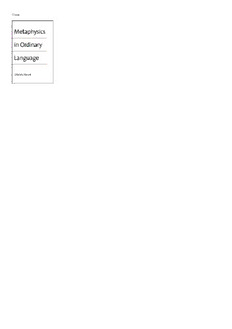
Metaphysics in ordinary language PDF
Preview Metaphysics in ordinary language
Cover Page i Metaphysics in Ordinary Language Page ii This page is intentionally left blank. Page iii Metaphysics in Ordinary Language Stanley Rosen Page iv Published with assistance from the Ernst Cassirer Publications Fund. Copyright © 1999 by Yale University. All rights reserved. This book may not be reproduced, in whole or in part, including illustrations, in any form (beyond that copying permitted by Sections 107 and 108 of the U.S. Copyright Law and except by reviewers for the public press), without written permission from the publishers. Printed in the United States of America. Library of Congress CataloginginPublication Data Rosen, Stanley, 1929 Metaphysics in ordinary language / Stanley Rosen. p.cm. Includes bibliographical references and index. ISBN 0300074786 (alk. paper) 1. Philosophy.I. Title. B945.R526M481999 191—dC219826477 CIP A catalogue record for this book is available from the British Library. The paper in this book meets the guidelines for permanence and durability of the Committee on Production Guidelines for Book Longevity of the Council on Library Resources. 10987654321 Page v To Jebediah Page vi This page is intentionally left blank. Page vii Contents Preface, ix Acknowledgments, xiii 1Suspicion, Deception, and Concealment, 1 2The Lived Present, 15 3Erotic Ascent, 39 4The Golden Apple, 62 5The Problem of Sense Perception in Plato's Philebus, 81 6Forms, Elements, and Categories, 102 7Technē and the Origins of Modernity, 112 8Sad Reason, 126 9Transcendental Indeterminateness, 144 10Freedom and Reason, 164 11Interpretation and the Fusion of Horizons, 182 Page viii 12Is There a Sign of Freedom?, 202 13Philosophy and Ordinary Experience, 218 14Nothing and Dialectic, 240 15Kojève's Paris: A Memoir, 258 Notes, 279 Index, 288 Page ix Preface The essays collected in this book originated for the most part as lectures for a variety of professional occasions. Three have not been previously published and two others are presented here in such radically altered form as to constitute new essays. Of the remainder, all but two have appeared in foreign languages or in publications that are not easily available. I am grateful to Yale University Press for allowing a larger audience to decide on their possible interest. The essays are united not by a common theme but by a common way of philosophizing. The reader will find here studies of abstract problems like that of negation and the relation between perception and judgment, but also discussions of eros, poetry, and freedom. A number of the essays are developments of a point made in previous publications, but some are attempts to break new ground. In some cases the analysis is associated with the interpretation of a particular text. In others, I take my bearings by a general problem. The collection closes with a memoir of my experience in the philosophical world of Paris in 1960–61. In spite of this thematic diversity, I believe that the essays to follow are united in two ways. The first unifying element is my conviction
